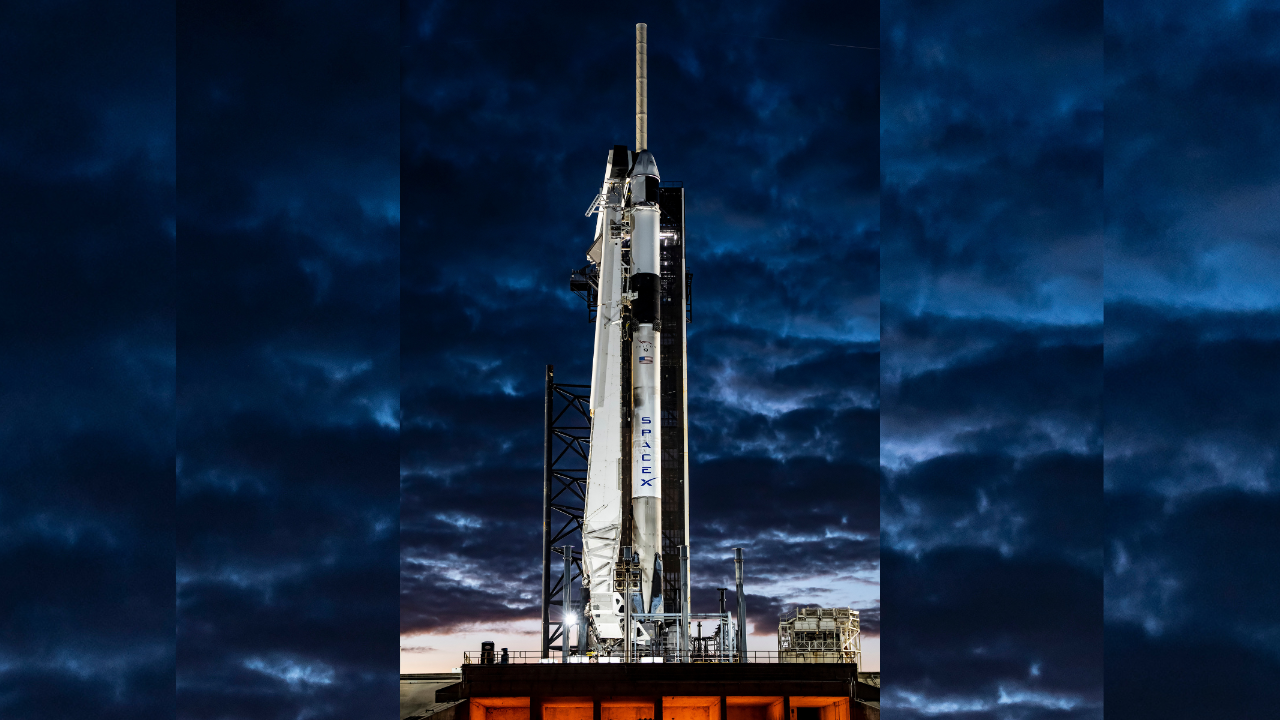NASA’s SpaceX CRS-33 to Advance Tissue Engineering, Stem Cell Research, and Space Computing

Falcon 9 rocket and Dragon spacecraft at vertical position in front of SpaceX's 29th commercial resupply services mission to the space station in 2023.
ISS National Lab-sponsored investigations seek to accelerate therapeutic innovations, advance computing technologies, and prepare the future workforce
August 21, 2025
KENNEDY SPACE CENTER (FL), August 21, 2025 – SpaceX’s 33rd commercial resupply services (CRS) mission, funded by NASANational Aeronautics and Space Administration, is slated to launch no earlier than 2:45 a.m. EDT on Sunday, August 24, from Cape Canaveral Space Force Station in Florida. The mission will carry critical research and supplies, including a diverse array of investigations sponsored by the International Space Station (ISSInternational Space Station) National Laboratory®.
During this mission, the ISS National Lab continues its commitment to enabling space-based research that brings value to humanity and supports the development of a robust and sustainable economy in low Earth orbit(Abbreviation: LEO) The orbit around the Earth that extends up to an altitude of 2,000 km (1,200 miles) from Earth’s surface. The International Space Station’s orbit is in LEO, at an altitude of approximately 250 miles.. The investigations launching include biomedical and physical science research, technology demonstrations, and student-led projects, showcasing the breadth of innovation made possible through access to the orbiting laboratory.
ISS National Lab-sponsored investigations on this mission include the following:
- Wake Forest Institute for Regenerative Medicine will study engineered liver tissue containing blood vessels in microgravityThe condition of perceived weightlessness created when an object is in free fall, for example when an object is in orbital motion. Microgravity alters many observable phenomena within the physical and life sciences, allowing scientists to study things in ways not possible on Earth. The International Space Station provides access to a persistent microgravity environment.. Originating from NASA’s Vascular Tissue Challenge, this project could advance tissue engineering in space to support future organ replacement for patients on Earth and beyond.
- Cedars-Sinai Medical Center will evaluate whether induced pluripotent stem cells divide faster in space, which could accelerate regenerative medicine breakthroughs. This project builds on multiple investigations from this research team over the years and could further in-space manufacturing capabilities to produce stem cell-based therapies for heart disease, neurodegenerative conditions, and more.
- ISS National Lab Commercial Service ProviderImplementation Partners that own and operate commercial facilities for the support of research on the ISS or are developing future facilities. Axiom Space is partnering with Red Hat, a leading provider of open-source solutions, to validate edge computing technologies through the Red Hat Device Edge platform. Real-time data processing capabilities in orbit will be paramount to scaling R&D and manufacturing on future space platforms.
- Multiple student-led projects aim to prepare the space workforce of tomorrow. One project is from the annual Genes in Space competition, in which students in grades 7-12 propose genetics-related investigations to be done on the space station. The project aims to use bacteriophages as therapeutic agents to combat potential microbial infections in space. Additionally, the Higher Orbits Go For Launch! program will send multiple experiments from students in Florida, Michigan, Pennsylvania, Texas, and Virginia.
These investigations reflect the growing demand for space-based R&D and the expanding role of the space station as a platform for innovation. The ISS National Lab is proud to support these efforts, pushing the limits of science and technology in space to benefit life on Earth.
To learn more about the science launching on this mission, visit our launch page.
Download a high-resolution image for this release: Space Station Resupply Mission
Media Contact:
Patrick O’Neill
904-806-0035
PONeill@ISSNationalLab.org
# # #
About the International Space Station (ISS) National Laboratory: The International Space Station (ISS) is a one-of-a-kind laboratory that enables research and technology development not possible on Earth. As a public service enterprise, the ISS National Laboratory® allows researchers to leverage this multiuser facility to improve quality of life on Earth, mature space-based business models, advance science literacy in the future workforce, and expand a sustainable and scalable market in low Earth orbit. Through this orbiting national laboratory, research resources on the ISS are available to support non-NASA science, technology, and education initiatives from U.S. government agencies, academic institutions, and the private sector. The Center for the Advancement of Science in Space® (CASIS®) manages the ISS National Lab, under Cooperative AgreementA cooperative agreement is Federal assistance that establishes a relationship between the U.S. Government and a recipient in which the principal purpose of the relationship is to accomplish a public purpose of support or stimulation. Since 2011, the Center for the Advancement of Science in Space™ (CASIS™) has managed the National Laboratory® through a Cooperative Agreement with NASA. with NASA, facilitating access to its permanent microgravity research environment, a powerful vantage point in low Earth orbit, and the extreme and varied conditions of space. To learn more about the ISS National Lab, visit our website.
As a 501(c)(3) nonprofit organization, CASIS(Abbreviation: CASIS™) The nonprofit organization that manages the ISS National Lab, which receives at least 50 percent of the U.S. research allocation on the International Space Station to facilitate research that benefits humanity (NASA manages the other 50% and focuses on research for space exploration purposes). accepts corporate and individual donations to help advance science in space for the benefit of humanity. For more information, visit our donations page.